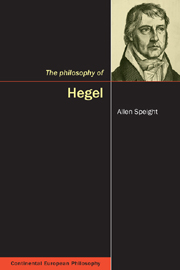Book contents
- Frontmatter
- Contents
- Acknowledgements
- Abbreviations
- Introduction
- 1 German Idealism and the young Hegel
- 2 The Phenomenology of Spirit
- 3 The Logic and Hegel's system
- 4 Ethics and politics
- 5 Hegel and the narrative task of history
- 6 Art, aesthetics and literary theory
- 7 Religion and philosophy
- Notes
- Guide to further reading
- Bibliography
- Index
3 - The Logic and Hegel's system
- Frontmatter
- Contents
- Acknowledgements
- Abbreviations
- Introduction
- 1 German Idealism and the young Hegel
- 2 The Phenomenology of Spirit
- 3 The Logic and Hegel's system
- 4 Ethics and politics
- 5 Hegel and the narrative task of history
- 6 Art, aesthetics and literary theory
- 7 Religion and philosophy
- Notes
- Guide to further reading
- Bibliography
- Index
Summary
As we saw in Chapter 2, the Phenomenology of Spirit is concerned with the ascent, through the various finite modes of consciousness, to the standpoint of Science – a standpoint which, says Hegel, “exists solely in the self-movement of the Concept” (PhS: §71). Hegel's prefatory and introductory remarks to the Science of Logic stress the purity and pre-suppositionlessness of this standpoint. “Pure Science presupposes liberation from the opposition of consciousness” – i.e. the very sort of opposition we have seen to be characteristic of the various moments of the Phenomenology; “it contains thought in so far as this is just as much the object in its own self, or the object in its own self in so far as it is equally pure thought” (SL: 49). The point of departure for such a science must be “an absolute … it may not presuppose anything, must not be mediated by anything nor have a ground; rather it is to be itself the ground of the entire science” (ibid.: 70).
These claims about the standpoint of the Logic raise many questions about the sort of philosophical undertaking in which it is engaged. What exactly does Hegel mean by a “presuppositionless” beginning? Can he really be justified in assuming that the Logic has one? What does Hegel mean when he says that “thought” and “object” are one and the same in the Logic? Do these claims concern a metaphysical or transcendental project, or both?
- Type
- Chapter
- Information
- The Philosophy of Hegel , pp. 51 - 66Publisher: Acumen PublishingPrint publication year: 2008

